Unit 1 What's the matter? Section A 3a-4c 课件(共46张PPT)
文档属性
| 名称 | Unit 1 What's the matter? Section A 3a-4c 课件(共46张PPT) |
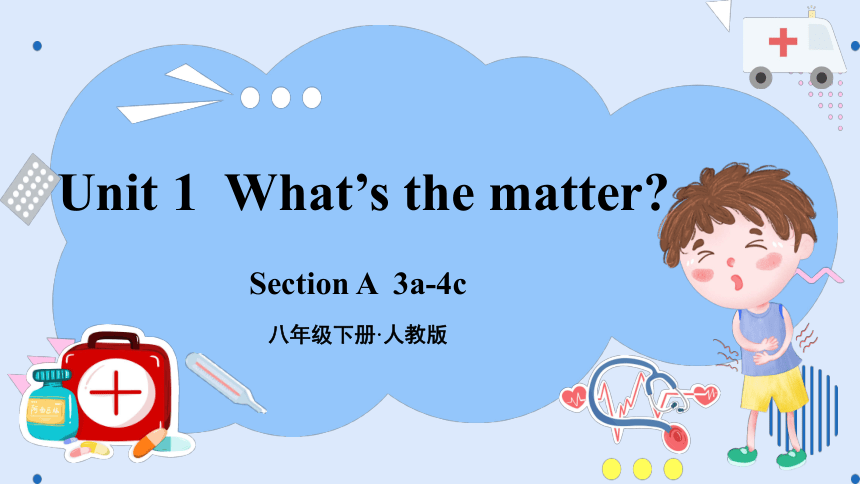
|
|
| 格式 | pptx | ||
| 文件大小 | 14.3MB | ||
| 资源类型 | 试卷 | ||
| 版本资源 | 人教新目标(Go for it)版 | ||
| 科目 | 英语 | ||
| 更新时间 | 2022-02-09 00:00:00 | ||
图片预览

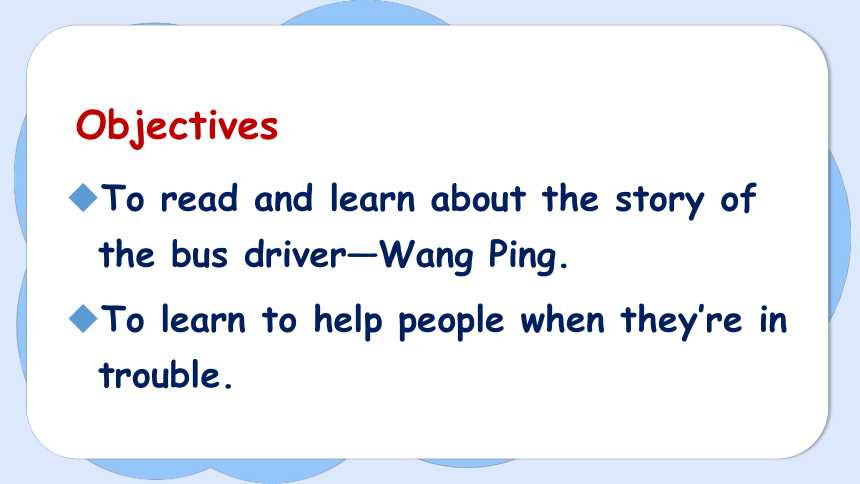
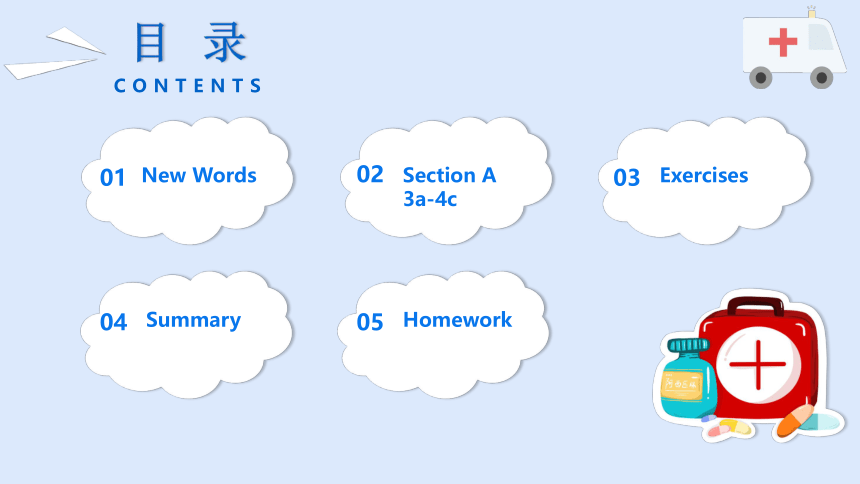

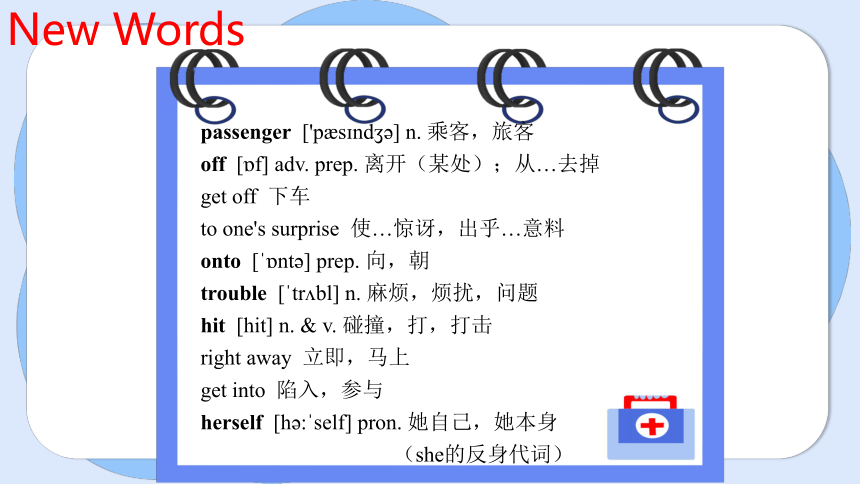
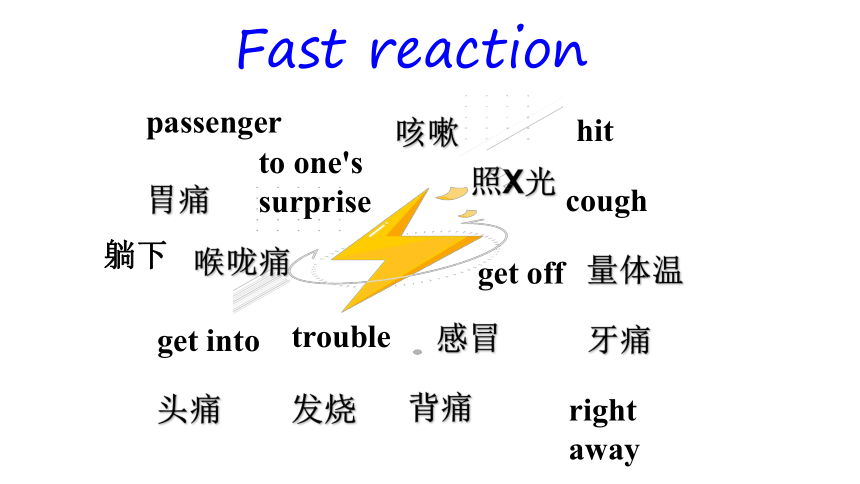
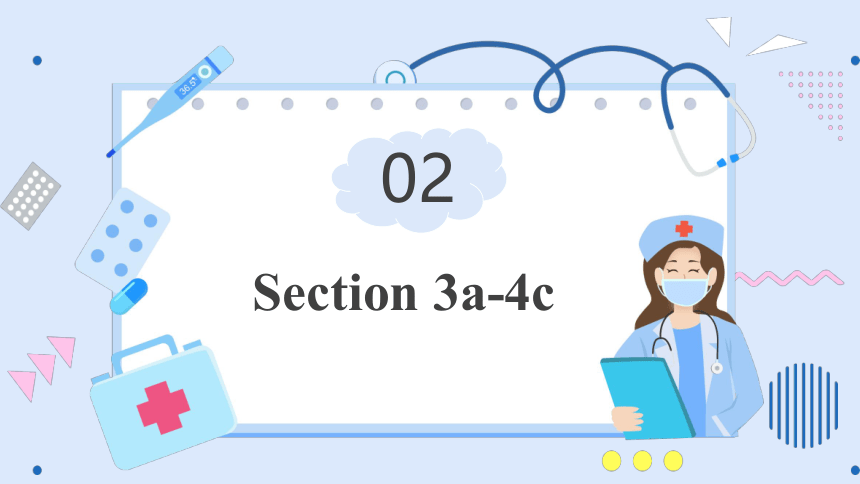
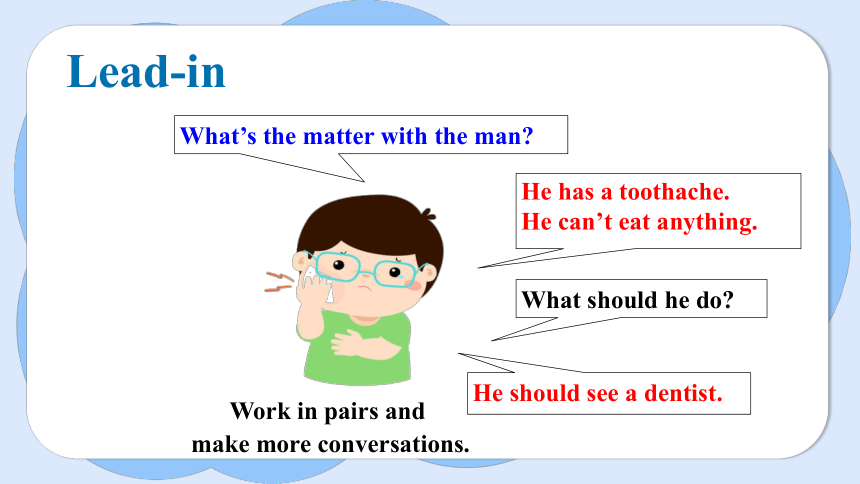
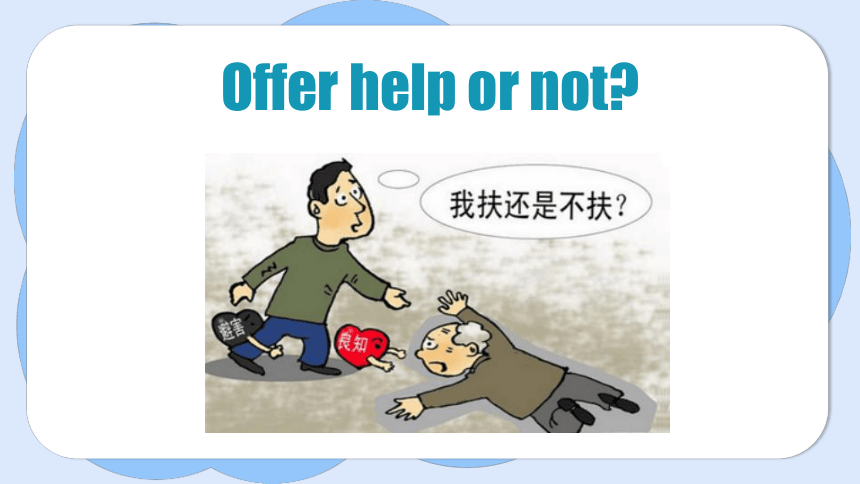
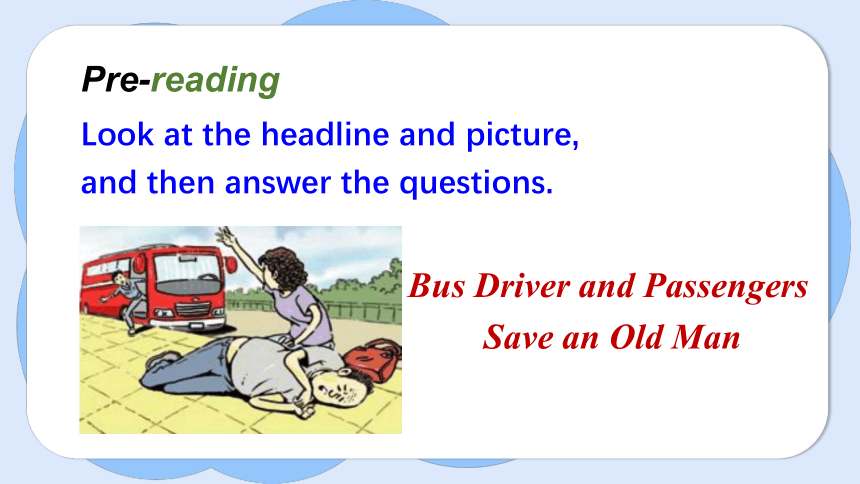
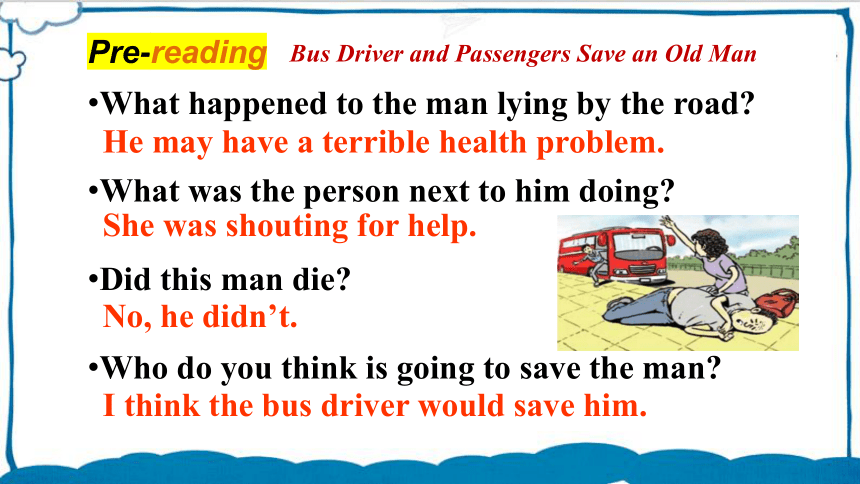
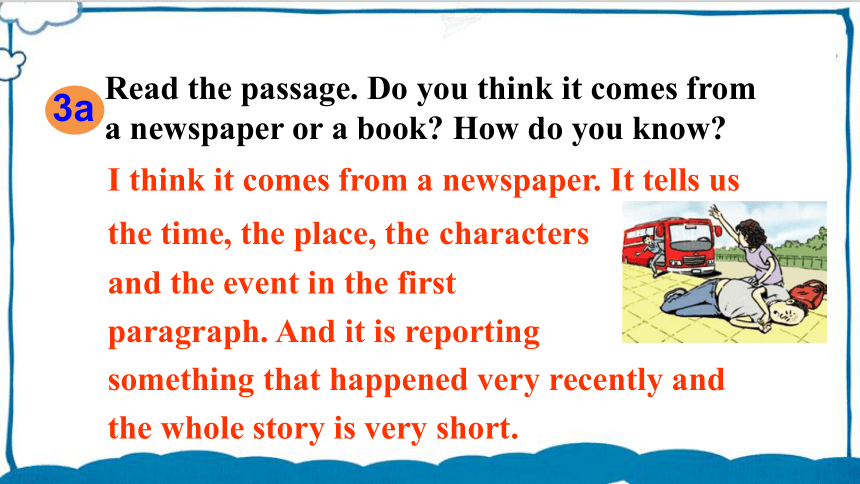
文档简介
(共46张PPT)
Unit 1 What’s the matter
Section A 3a-4c
八年级下册·人教版
Objectives
To read and learn about the story of the bus driver—Wang Ping.
To learn to help people when they’re in trouble.
目录
CONTENTS
New Words
01
Summary
04
Section A
3a-4c
02
Homework
05
Exercises
03
New Words
01
New Words
passenger ['p s nd ] n. 乘客,旅客
off [ f] adv. prep. 离开(某处);从…去掉
get off 下车
to one's surprise 使…惊讶,出乎…意料
onto [ nt ] prep. 向,朝
trouble [ tr bl] n. 麻烦,烦扰,问题
hit [hit] n. & v. 碰撞,打,打击
right away 立即,马上
get into 陷入,参与
herself [h : self] pron. 她自己,她本身
(she的反身代词)
passenger
胃痛
喉咙痛
trouble
发烧
get off
头痛
咳嗽
感冒
牙痛
to one's surprise
背痛
right away
照X光
cough
量体温
躺下
get into
hit
Fast reaction
Section 3a-4c
02
Lead-in
What’s the matter with the man
He has a toothache.
He can’t eat anything.
What should he do
He should see a dentist.
Work in pairs and
make more conversations.
Offer help or not
Pre-reading
Look at the headline and picture,
and then answer the questions.
Bus Driver and Passengers
Save an Old Man
What happened to the man lying by the road
What was the person next to him doing
Did this man die
Who do you think is going to save the man
He may have a terrible health problem.
She was shouting for help.
No, he didn’t.
I think the bus driver would save him.
Bus Driver and Passengers Save an Old Man
Pre-reading
3a
Read the passage. Do you think it comes from a newspaper or a book How do you know
I think it comes from a newspaper. It tells us the time, the place, the characters
and the event in the first
paragraph. And it is reporting
something that happened very recently and
the whole story is very short.
Bus Driver and Passengers Save an Old Man
At 9:00 a.m. yesterday, bus No. 26 was going along Zhonghua Road when the driver saw an old man lying on the side of the road. A woman next to him was shouting for help.
The bus driver, 24-year-old Wang Ping, stopped the bus without thinking twice. He got off and asked the woman what happened. She said that the man had a heart problem and should go to the hospital.
没有多想
呼救
下车
Mr. Wang knew he had to act quickly. He told the passengers that he must take the man to the hospital. He expected most or all of the passengers to get off and wait for the next bus. But to his surprise, they all agreed to go with him. Some passengers helped Mr. Wang to move the man onto the bus.
快速行动
to one’s surprise 使……惊讶的是,出乎……意料
Thanks to Mr. Wang and the passengers, the man was saved by the doctors in time. “It’s sad that many people don’t want to help others because they don’t want any trouble”, says one passenger. “But the driver didn’t think about himself. He only thought about saving a life.”
及时
Read the passage again and check (√) the things that happened in the story.
3b
1 ____ Wang Ping was the driver of bus No.26 at 9:00
a.m. yesterday.
2 ____ Bus No. 26 hit an old man on Zhonghua Road.
3 ____ The old man had a heart problem and needed
to go to the hospital right away.
√
√
4 ____ The passengers on the bus did not want to go to
the hospital, so only Wang Ping went with the
woman and old man.
5 ____ Some passengers helped to get the old man onto
the bus.
6 ____ The old man got to the hospital in time.
√
√
Fill in the blanks according to the story.
Wang Ping, a bus driver, was going _____ Zhonghua Road when he saw an old man ____ on the side of the road and a woman next to him shouting for help. He stopped the bus without _____________. He got off and asked the woman _____ happened. She said that the man had a heart _________ and should go to the hospital. Wang Ping told the passengers that he must _____ the man to the hospital.
lying
along
thinking twice
what
problem
take
Why was Wang Ping surprised that the passengers agreed to go to the hospital with him
2. Did the passengers think Wang Ping did the right thing How do you know
3. Do you agree that people often do not help others because they do not want to get into trouble Why or why not
Discuss the questions with a partner.
3c
1.Why was Wang Ping surprised that the passengers
agreed to go to the hospital with him
2. Did the passengers think Wang Ping did the right thing
How do you know
Because he thought that there were no passengers who agreed to go with him.
Yes, they did. Because they went with him together.
3. Do you agree that people often do not help
others because they don’t want to get into
trouble Why or why not
Yes, I agree because...
No, I don’t agree because...
1. …, bus No. 26 was going along Zhonghua Road when the driver saw an old man lying on the side of the road.
(1)was doing: 过去进行时
定义: 表示在过去某一时刻或某一时间内进行或发生的动作
结构: was/were+ v.-ing
常用时间状语:
at that time,at seven last night
from seven to nine yesterday
when/while+从句...
Language Points
(2)see sb. doing sth. 看见某人正在做某事
e.g. When I passed by I saw him drawing a picture.
see sb. do sth. 看见某人做某事,强调动作经常发生或看见动作发生的整个过程。
e.g. I often see him draw a picture.
Exercises:
1) 我看着他过了桥。
I see him _____ across the bridge.
2) 我看见她正在洗衣服。
I see her ________ the clothes.
walk
washing
2. He expected most or all the passengers to get
off and wait for the next bus.
(1) expect + to do sth. 期望做某事。
她期望明天去上学。
She expects to go to school tomorrow.
(2) expect + sb. to do sth.预料/期待某人做某事。
我们期望他进入一所好大学。
We expect him to get into a good university.
(3) expect + that从句
我希望他可以帮助我。
I expect that he can help me.
3.But to his surprise, they all agreed to go with Him.
(1)to one’s surprise
使……惊讶的是,出乎……意料
e.g. To their surprise, all the students pass the exam.
Much to everyone’s surprise, the plan succeeded.
类似表达:
to one’s happiness/ joy 令某人高兴的是
to one’s regret 令某人遗憾的是
to one’s disappointment 令某人失望的是
拓展
surprised 形容词 常修饰人
surprising 形容词 常修饰物
surprisingly 副词 修饰动词、形容词
I was surprised at the news.我对这个消息感到很惊讶。
What surprising news!多么令人惊讶的消息呀!
The weather was surprisringly warm and sunny.
天气出奇地暖和,阳光明媚。
agree with sb.
同意某人(的意见、观点、做法等)
agree to ( a plan/suggestion... )
同意(计划、建议……)
agree on/ upon… 就……达成一致意见
agree
(2)agree的用法
agree to do sth. 同意做某事
拓展:反义词-disagree
1.——锻炼对我们的健康有好处。
——我同意你(的观点)。
2.——你同意那个计划吗?
——是的,它好极了。
3.我们最后就这个问题达成了一致意见。
—Exercising is good for our health.
—I ____________ you.
—Do you __________ the plan
—Yes, it’s wonderful.
We ___________ the question at last.
agree with
agree to
agreed on
典例剖析
4. Thanks to Mr. Wang and the passengers, the man was saved by the doctors in time.
(1)thanks to 多亏;由于
多亏了你的帮助, 我们才得以成功。
Thanks to your help, we were successful.
拓展
thanks for (doing) sth. 因(做某事)而感谢
谢谢你的帮助。
Thanks for your help.
(2)in time 及时
on time 按时
我及时赶上了会议。
I was just in time for the meeting.
火车准时到达。
The train arrived on time.
5. ... because they don’t want any trouble ...
当trouble意为“困难;麻烦”时,是不可数名词。
I’m sorry to give you so much trouble.
(1)be in trouble 处于困境之中
He always asks me for help when he is in trouble.
(2)get sb. into trouble (使某人)陷入困境
If you come, you may get me into trouble.
(3) 主语 + have / has trouble (in) doing sth.
意为“某人在做某事方面有困难”。
I have some trouble (in) reading the letter.
当trouble意为“麻烦事;烦心事”时,是可数名词。
She was on the phone for an hour telling me her troubles.
根据汉语意思完成英语句子。
(1) 他认为每天吃饭是一件麻烦事。
He thinks that eating every day is _________.
(2) 你知道你现在为什么处于困境吗?
Do you know why you _____________ now
(3) 我妹妹在学习英语方面有困难。
My sister _____________________ English.
a trouble
are in trouble
has trouble in studying
Practice
What’s the matter I have a stomachache. You shouldn’t eat so much next time.
What’s the matter with Ben He hurt himself. He has a sore back. He should lie down and rest.
Do you have a fever Yes, I do./No, I don’t./I don’t know. Does he have a toothache Yes, he does. He should see a dentist and get an X-ray. What should she do She should take her temperature. Should I put some medicine on it Yes, you should./No, you shouldn’t. Grammar Focus
情态动词 should的用法
should是情态动词, 意为“应该”, 后接动词原形, 表示责任和义务、 征询意见或建议等。
否定形式:
should not / shouldn’t “不应当;不该”
含有should的肯定句变为一般疑问句时, 应将should提至句首:
She should take her temperature.
Should she take her temperature
肯定回答:Yes, 主语+should.
否定回答:No, 主语+shouldn’t.
请根据健康问题用should给出恰当的建议。
1. Mike has a toothache.
2. One of my classmates has a cold.
3. Mary cut herself.
He should see a dentist.
He / She should go to a doctor.
She should put some medicine on the cut.
Practice
Exercises
03
典例剖析
1.— Mrs. Smith, I have some _________ sleeping. Would you mind ________ the music a bit, please
— OK, of course not.
A.troubles;turning up
B.trouble;turning down
C.problem;to turn down
D.problems;turning off
典例剖析
2.Steven, we should ______ the bus at the next stop.
A.get up B.get off C.get to D.get in
3.—I often hear Linda ______in the next room.
—Yeah. I also saw her ______ the piano at seven just now. She is good at music.
A.sing; playing B.singing; played
C.singing; playing D.sing; play
典例剖析
4.— I think washing hands every day is good ________ our health.
— Yes, I agree ________ you!
A.to; to B.with; to C.for; with D.at; with
5.使他吃惊的是,十堰近几年发生了很大变化。
______________, Shiyan has changed a lot in recent years.
To his surprise
Summary
04
重点回顾
1.see相关搭配
2.surprise相关用法
3.agree相关搭配
4.thanks to与thanks for
5.in time与on time
6.trouble相关搭配
7.expect搭配
8.should用法
Homework
05
Homework
1. Read the article and review key words, sentences,
language points .
2.Review the grammar focus we have learned in
this period.
3. Do the exercises.
THANK YOU !
Unit 1 What’s the matter
Section A 3a-4c
八年级下册·人教版
Objectives
To read and learn about the story of the bus driver—Wang Ping.
To learn to help people when they’re in trouble.
目录
CONTENTS
New Words
01
Summary
04
Section A
3a-4c
02
Homework
05
Exercises
03
New Words
01
New Words
passenger ['p s nd ] n. 乘客,旅客
off [ f] adv. prep. 离开(某处);从…去掉
get off 下车
to one's surprise 使…惊讶,出乎…意料
onto [ nt ] prep. 向,朝
trouble [ tr bl] n. 麻烦,烦扰,问题
hit [hit] n. & v. 碰撞,打,打击
right away 立即,马上
get into 陷入,参与
herself [h : self] pron. 她自己,她本身
(she的反身代词)
passenger
胃痛
喉咙痛
trouble
发烧
get off
头痛
咳嗽
感冒
牙痛
to one's surprise
背痛
right away
照X光
cough
量体温
躺下
get into
hit
Fast reaction
Section 3a-4c
02
Lead-in
What’s the matter with the man
He has a toothache.
He can’t eat anything.
What should he do
He should see a dentist.
Work in pairs and
make more conversations.
Offer help or not
Pre-reading
Look at the headline and picture,
and then answer the questions.
Bus Driver and Passengers
Save an Old Man
What happened to the man lying by the road
What was the person next to him doing
Did this man die
Who do you think is going to save the man
He may have a terrible health problem.
She was shouting for help.
No, he didn’t.
I think the bus driver would save him.
Bus Driver and Passengers Save an Old Man
Pre-reading
3a
Read the passage. Do you think it comes from a newspaper or a book How do you know
I think it comes from a newspaper. It tells us the time, the place, the characters
and the event in the first
paragraph. And it is reporting
something that happened very recently and
the whole story is very short.
Bus Driver and Passengers Save an Old Man
At 9:00 a.m. yesterday, bus No. 26 was going along Zhonghua Road when the driver saw an old man lying on the side of the road. A woman next to him was shouting for help.
The bus driver, 24-year-old Wang Ping, stopped the bus without thinking twice. He got off and asked the woman what happened. She said that the man had a heart problem and should go to the hospital.
没有多想
呼救
下车
Mr. Wang knew he had to act quickly. He told the passengers that he must take the man to the hospital. He expected most or all of the passengers to get off and wait for the next bus. But to his surprise, they all agreed to go with him. Some passengers helped Mr. Wang to move the man onto the bus.
快速行动
to one’s surprise 使……惊讶的是,出乎……意料
Thanks to Mr. Wang and the passengers, the man was saved by the doctors in time. “It’s sad that many people don’t want to help others because they don’t want any trouble”, says one passenger. “But the driver didn’t think about himself. He only thought about saving a life.”
及时
Read the passage again and check (√) the things that happened in the story.
3b
1 ____ Wang Ping was the driver of bus No.26 at 9:00
a.m. yesterday.
2 ____ Bus No. 26 hit an old man on Zhonghua Road.
3 ____ The old man had a heart problem and needed
to go to the hospital right away.
√
√
4 ____ The passengers on the bus did not want to go to
the hospital, so only Wang Ping went with the
woman and old man.
5 ____ Some passengers helped to get the old man onto
the bus.
6 ____ The old man got to the hospital in time.
√
√
Fill in the blanks according to the story.
Wang Ping, a bus driver, was going _____ Zhonghua Road when he saw an old man ____ on the side of the road and a woman next to him shouting for help. He stopped the bus without _____________. He got off and asked the woman _____ happened. She said that the man had a heart _________ and should go to the hospital. Wang Ping told the passengers that he must _____ the man to the hospital.
lying
along
thinking twice
what
problem
take
Why was Wang Ping surprised that the passengers agreed to go to the hospital with him
2. Did the passengers think Wang Ping did the right thing How do you know
3. Do you agree that people often do not help others because they do not want to get into trouble Why or why not
Discuss the questions with a partner.
3c
1.Why was Wang Ping surprised that the passengers
agreed to go to the hospital with him
2. Did the passengers think Wang Ping did the right thing
How do you know
Because he thought that there were no passengers who agreed to go with him.
Yes, they did. Because they went with him together.
3. Do you agree that people often do not help
others because they don’t want to get into
trouble Why or why not
Yes, I agree because...
No, I don’t agree because...
1. …, bus No. 26 was going along Zhonghua Road when the driver saw an old man lying on the side of the road.
(1)was doing: 过去进行时
定义: 表示在过去某一时刻或某一时间内进行或发生的动作
结构: was/were+ v.-ing
常用时间状语:
at that time,at seven last night
from seven to nine yesterday
when/while+从句...
Language Points
(2)see sb. doing sth. 看见某人正在做某事
e.g. When I passed by I saw him drawing a picture.
see sb. do sth. 看见某人做某事,强调动作经常发生或看见动作发生的整个过程。
e.g. I often see him draw a picture.
Exercises:
1) 我看着他过了桥。
I see him _____ across the bridge.
2) 我看见她正在洗衣服。
I see her ________ the clothes.
walk
washing
2. He expected most or all the passengers to get
off and wait for the next bus.
(1) expect + to do sth. 期望做某事。
她期望明天去上学。
She expects to go to school tomorrow.
(2) expect + sb. to do sth.预料/期待某人做某事。
我们期望他进入一所好大学。
We expect him to get into a good university.
(3) expect + that从句
我希望他可以帮助我。
I expect that he can help me.
3.But to his surprise, they all agreed to go with Him.
(1)to one’s surprise
使……惊讶的是,出乎……意料
e.g. To their surprise, all the students pass the exam.
Much to everyone’s surprise, the plan succeeded.
类似表达:
to one’s happiness/ joy 令某人高兴的是
to one’s regret 令某人遗憾的是
to one’s disappointment 令某人失望的是
拓展
surprised 形容词 常修饰人
surprising 形容词 常修饰物
surprisingly 副词 修饰动词、形容词
I was surprised at the news.我对这个消息感到很惊讶。
What surprising news!多么令人惊讶的消息呀!
The weather was surprisringly warm and sunny.
天气出奇地暖和,阳光明媚。
agree with sb.
同意某人(的意见、观点、做法等)
agree to ( a plan/suggestion... )
同意(计划、建议……)
agree on/ upon… 就……达成一致意见
agree
(2)agree的用法
agree to do sth. 同意做某事
拓展:反义词-disagree
1.——锻炼对我们的健康有好处。
——我同意你(的观点)。
2.——你同意那个计划吗?
——是的,它好极了。
3.我们最后就这个问题达成了一致意见。
—Exercising is good for our health.
—I ____________ you.
—Do you __________ the plan
—Yes, it’s wonderful.
We ___________ the question at last.
agree with
agree to
agreed on
典例剖析
4. Thanks to Mr. Wang and the passengers, the man was saved by the doctors in time.
(1)thanks to 多亏;由于
多亏了你的帮助, 我们才得以成功。
Thanks to your help, we were successful.
拓展
thanks for (doing) sth. 因(做某事)而感谢
谢谢你的帮助。
Thanks for your help.
(2)in time 及时
on time 按时
我及时赶上了会议。
I was just in time for the meeting.
火车准时到达。
The train arrived on time.
5. ... because they don’t want any trouble ...
当trouble意为“困难;麻烦”时,是不可数名词。
I’m sorry to give you so much trouble.
(1)be in trouble 处于困境之中
He always asks me for help when he is in trouble.
(2)get sb. into trouble (使某人)陷入困境
If you come, you may get me into trouble.
(3) 主语 + have / has trouble (in) doing sth.
意为“某人在做某事方面有困难”。
I have some trouble (in) reading the letter.
当trouble意为“麻烦事;烦心事”时,是可数名词。
She was on the phone for an hour telling me her troubles.
根据汉语意思完成英语句子。
(1) 他认为每天吃饭是一件麻烦事。
He thinks that eating every day is _________.
(2) 你知道你现在为什么处于困境吗?
Do you know why you _____________ now
(3) 我妹妹在学习英语方面有困难。
My sister _____________________ English.
a trouble
are in trouble
has trouble in studying
Practice
What’s the matter I have a stomachache. You shouldn’t eat so much next time.
What’s the matter with Ben He hurt himself. He has a sore back. He should lie down and rest.
Do you have a fever Yes, I do./No, I don’t./I don’t know. Does he have a toothache Yes, he does. He should see a dentist and get an X-ray. What should she do She should take her temperature. Should I put some medicine on it Yes, you should./No, you shouldn’t. Grammar Focus
情态动词 should的用法
should是情态动词, 意为“应该”, 后接动词原形, 表示责任和义务、 征询意见或建议等。
否定形式:
should not / shouldn’t “不应当;不该”
含有should的肯定句变为一般疑问句时, 应将should提至句首:
She should take her temperature.
Should she take her temperature
肯定回答:Yes, 主语+should.
否定回答:No, 主语+shouldn’t.
请根据健康问题用should给出恰当的建议。
1. Mike has a toothache.
2. One of my classmates has a cold.
3. Mary cut herself.
He should see a dentist.
He / She should go to a doctor.
She should put some medicine on the cut.
Practice
Exercises
03
典例剖析
1.— Mrs. Smith, I have some _________ sleeping. Would you mind ________ the music a bit, please
— OK, of course not.
A.troubles;turning up
B.trouble;turning down
C.problem;to turn down
D.problems;turning off
典例剖析
2.Steven, we should ______ the bus at the next stop.
A.get up B.get off C.get to D.get in
3.—I often hear Linda ______in the next room.
—Yeah. I also saw her ______ the piano at seven just now. She is good at music.
A.sing; playing B.singing; played
C.singing; playing D.sing; play
典例剖析
4.— I think washing hands every day is good ________ our health.
— Yes, I agree ________ you!
A.to; to B.with; to C.for; with D.at; with
5.使他吃惊的是,十堰近几年发生了很大变化。
______________, Shiyan has changed a lot in recent years.
To his surprise
Summary
04
重点回顾
1.see相关搭配
2.surprise相关用法
3.agree相关搭配
4.thanks to与thanks for
5.in time与on time
6.trouble相关搭配
7.expect搭配
8.should用法
Homework
05
Homework
1. Read the article and review key words, sentences,
language points .
2.Review the grammar focus we have learned in
this period.
3. Do the exercises.
THANK YOU !
同课章节目录
- Unit 1 What's the matter?
- Section A
- Section B
- Unit 2 I'll help to clean up the city parks.
- Section A
- Section B
- Unit 3 Could you please clean your room?
- Section A
- Section B
- Unit 4 Why don't you talk to your parents?
- Section A
- Section B
- Unit 5 What were you doing when the rainstorm came
- Section A
- Section B
- Review of Units 1-5
- Unit 6 An old man tried to move the mountains.
- Section A
- Section B
- Unit 7 What's the highest mountain in the world?
- Section A
- Section B
- Unit 8 Have you read Treasure Island yet?
- Section A
- Section B
- Unit 9 Have you ever been to a museum?
- Section A
- Section B
- Unit 10 I've had this bike for three years.
- Section A
- Section B
